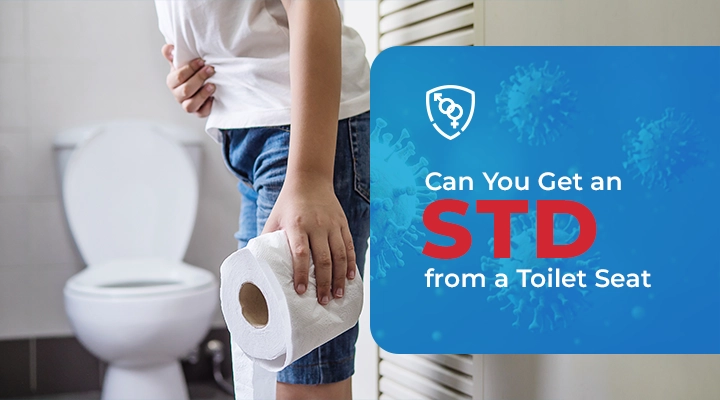We’ve all wondered at some point, can you really catch an STD from a toilet seat? It’s one of the most common and long-standing myths about sexually transmitted diseases (STDs). The short answer: no, you can’t get an STD from a toilet seat.
Let’s explore why this misconception persists, how STDs actually spread, and what really matters when it comes to restroom hygiene.
How STDs Actually Spread
Most sexually transmitted infections (STIs) and diseases (STDs) require direct person-to-person contact, typically through sexual activity or the exchange of bodily fluids.
Common modes of transmission include:
- Vaginal, anal, or oral sex
- Contact with infected genital fluids (semen, vaginal secretions, or blood)
- Skin-to-skin transmission for some infections like HPV or Herpes
Toilet seats, however, are dry and nonporous. The viruses and bacteria that cause STDs cannot survive long outside the human body, especially on cold, dry surfaces. Once exposed to air and disinfectants, they lose their ability to infect.
If you’ve ever worried about symptoms like blisters or irritation, you can always get peace of mind with a quick herpes test.
Science Behind STD Transmission and Toilet Seats
Studies show that infections like chlamydia, gonorrhea, syphilis, and HIV can’t spread through toilet seats or other surfaces. These STDs require direct sexual contact or exchange of fluids such as blood, semen, or vaginal secretions.
Pathogens that cause STDs survive only in warm, moist environments inside the body. Once exposed to air or cleaning agents, they lose viability quickly. Even if urine or discharge is present, infection risk is negligible—HIV, for example, becomes inactive almost instantly outside the body.
For peace of mind, schedule an HIV test or a full comprehensive STD panel for confidential same-day results.
Common STD Myths Debunked
Let’s clear up some of the most common myths once and for all:
Myth 1: You can get chlamydia or gonorrhea from a toilet seat
False. Both chlamydia and gonorrhea require direct genital contact or exchange of fluids. These bacteria cannot live long outside the human body.
If you’re sexually active or recently had unprotected sex, you can get tested for peace of mind through our chlamydia testing or gonorrhea testing.
Myth 2: HPV or syphilis can spread through bathroom contact
HPV and syphilis are spread through skin-to-skin contact during sexual activity, not surfaces. While HPV can live briefly on objects, transmission from toilet seats has never been documented.
If you want reassurance or preventive screening, book an HPV test or syphilis test.
Myth 3: Chlamydia discharge on toilet paper means risk
Even if discharge were present, once outside the body, chlamydia bacteria die quickly. Transmission this way is virtually impossible.
Some people also wonder about trichomoniasis, a parasitic infection. It can rarely survive outside the body, but transmission from surfaces is extremely uncommon. For clarity, you can get discreet trichomoniasis testing.
Possible Skin Irritations or Rashes from Toilet Seats (Non-STD Causes)
While you can’t catch an STD from a toilet seat, some people experience skin irritation or rashes after using public restrooms.
Common causes include:
- Allergic reactions to cleaning chemicals
- Contact dermatitis from plastic or wooden seats
- Bacteria causing mild skin irritation (not STDs)
These issues are not sexually transmitted and typically go away on their own.
Why Hygiene Still Matters
Good restroom hygiene prevents common (non-STD) infections, including urinary tract infections (UTIs) and gastrointestinal illnesses.
- Wash hands thoroughly with soap and water
- Use toilet seat covers when available
- Avoid direct skin contact with public restroom surfaces
- Stay hydrated to maintain urinary health
Even though you can’t get an STD this way, proper hygiene supports overall wellness and helps prevent minor bacterial infections.
When To See A Doctor
If you notice unusual discharge, itching, burning, or persistent rash, see our healthcare providers. These symptoms could signal another condition that requires attention and if you’re sexually active, regular STD testing is one of the best ways to protect your health and your partner’s.
Consider a Comprehensive STD Panel to cover the most common infections, or schedule specific tests like hepatitis B & C Testing for complete clarity.
Prevention Tips & Safe Practices
- Practice safe sex with barrier protection (condoms, dental dams)
- Get vaccinated against HPV and Hepatitis B
- Maintain open communication with partners
- Keep up with routine STI testing
Conclusion
No, you can’t catch an STD from a toilet seat. The germs responsible for sexually transmitted diseases can’t survive long enough on toilet surfaces to infect anyone.
Still, maintaining good hygiene and getting tested regularly are key parts of staying healthy.
If you want peace of mind, consider scheduling a confidential, same-day STD test with Manhattan STD Testing — professional, discreet, and accurate care that helps you stay safe and informed.
Frequently Asked Questions
Can you get an STD from sharing towels or underwear?
No. While some infections like pubic lice can transfer through fabrics, STDs such as HIV, chlamydia, or gonorrhea require direct sexual contact to spread.
Does sitting on a wet toilet seat increase infection risk?
A damp toilet seat might feel unpleasant, but it doesn’t transmit STDs. However, prolonged moisture can cause mild skin irritation or yeast imbalance in sensitive individuals.
Can poor restroom hygiene cause vaginal or penile infections?
Yes, but they’re not STDs. Unclean restrooms can promote bacterial or fungal infections like UTIs or yeast infections, not sexually transmitted ones.
Is it possible to get an STD from public pool water or hot tubs?
No. Chlorine and water exposure kill STD pathogens almost instantly. The risk comes only from sexual activity, not shared water.
How often should sexually active adults get tested?
Sexually active adults should get tested at least once a year and more often if they have new or multiple partners. Regular testing helps detect infections early and maintain overall sexual health.
Disclaimer
This blog is for informational & educational purposes only and does not intend to substitute any professional medical advice or consultation. For any health-related concerns, please consult with your physician, or call 911.

-
About The Author
Dr. Syra Hanif M.D.Board Certified Primary Care Physician
Dr. Syra Hanif is a board-certified Primary Care Physician (PCP) dedicated to providing compassionate, patient-centered healthcare.


